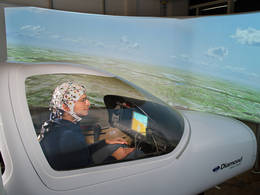
A new research by a team of researchers have demonstrated brain-controlled aircraft that is likely to hit the sky in the near future.
Scientists at Technische Universität Berlin, or, Technical University of Berlin and Technische Universität München (TUM) have developed a machine that can control a plane using only the brain of the pilot. With a wired cap on head, the pilot can use his mind to control and even make a safe landing of a flight. Scientists working for Professor Florian Holzapfel project at the Institute for Flight System Dynamics of the TUM are finding new ways in which brain-controlled aircraft may work under the European Union funded project named "Brainflight."
"A long-term vision of the project is to make flying accessible to more people," said Tim Fricke, the lead in the project in TUM, in a news release. "With brain control, flying, in itself, could become easier. This would reduce the work load of pilots and thereby increase safety. In addition, pilots would have more freedom of movement to manage other manual tasks in the cockpit." he added.
In order for machines and humans to communicate, the controller's brain waves are measured using Electroencephalography (EEG) electrode cables connected to the head cap. Scientists at the Department of Biological Psychology and Neuroergonomics at the Berlin Institute of Technology have developed an algorithm through which electrical programs gets converted to helpful commands.
The system operates when the pilot thinks about commands without making any physical movements of controlling pedals or other equiptments for flying the aircraft.
For testing the system, the researchers conducted seven subjects for participating in flight simulator tests. The volunteers had different levels of flight experience, with one of the volunteers having no practical cockpit experience whatsoever. In the test, several participants managed to land under poor visibility.
"One of the subjects was able to follow eight out of ten target headings with a deviation of only 10 degrees," said Fricke in the news release.
The thought-controlled flight has to undergo lot more research and experiments, in order to improve the system and its accuracy before it takes off.
Scientists at TUM are currently focusing on the requirement for the flight dynamics and control system that are needed to be changed to accommodate the new control system. Usually, pilots experience resistance in steering and have to apply significant force when the loads on the aircraft become overloaded. The thought-controlled system has not yet being able to achieve this. Researchers are looking for some alternative methods to signal when to push the signal hard.
Ultimately, a thought-controlled aircraft would be much comfortable and easier to fly than contemporary craft, in a way giving more passengers the ability to take up the pleasant skies. A long-term vision of the project is to make flying accessible to more people, explained Fricke.
The researchers are optimistic and will present their project results at "Deutscher Luft- und Raumfahrtkongress" by the end of September 2014.
















